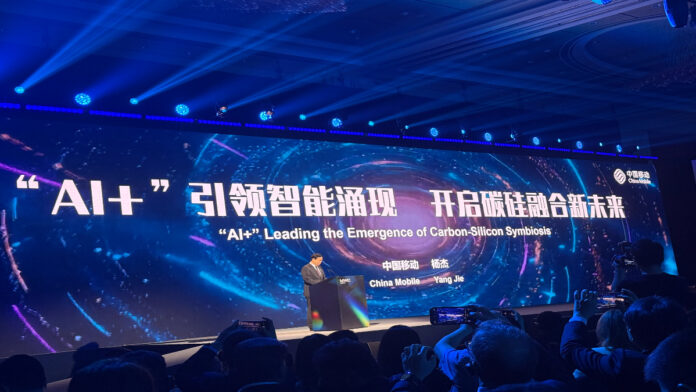The chairman of China Mobile said future networks such as 6G will play a key role by offering ultra-low latency, high-efficiency communication
In sum – what to know:
Entering the AI+ era – China Mobile chairman Yang Jie said artificial intelligence is the new driver of industrial and societal change.
Rise of silicon-based life – Intelligent machines will become decision-making agents in all aspects of life, eventually outnumbering humans and contributing to a new kind of social and economic workforce.
Call for global AI collaboration – Yang urged global partners to join in creating a trusted AI ecosystem based on shared innovation, secure data and ethical development.
SHANGHAI – Artificial intelligence (AI) is already ushering in a new era of technological and societal transformation, and its fusion with human activity — what China Mobile calls “carbon-silicon symbiosis” — will define the next wave of industrial development, said Yang Jie, chairman of China Mobile, during his keynote address at the recent MWC Shanghai 2025 event.
The boss of China Mobile, the world’s largest operator by subscribers, opened his keynote by framing AI as the latest technological force following what he called the “Internet+” and “5G+” eras. He said we are now entering the “AI+” era, in which artificial intelligence serves as a strategic driver of economic and industrial transformation. With AI capabilities now matching or surpassing human-level performance in areas like language understanding and image classification, the executive emphasized the growing role of “silicon-based life” — a metaphor for intelligent machines.
The executive also described a future where sensors, processors, memory and control systems will work together like a nervous system. Integrated into smart devices, vehicles and robots, these silicon-based agents will become ubiquitous and serve as decision-making tools embedded across society. According to Yang, these intelligent systems will eventually outnumber humans, becoming vital parts of the social workforce and knowledge economy.
In his speech, the China Mobile executive also argued that the digital and physical worlds are on a path of deep convergence. In this futuristic scenario, AI agents will always be online and will increasingly map and simulate the real world, expanding the scope of human activities in production, communication and research. This fusion, Yang noted, will accelerate innovation cycles and improve economic efficiency, paving the way for an “intelligent economy.”
Yang also called for accelerating innovation in what he referred to as the “silicon-based life” through computational and cognitive intelligence. He highlighted the importance of AI agents capable of autonomous action, self-evolution and collective learning. These agents, he said, will function much like humans — able to collaborate, create and learn through experience.
In this vision, future networks such as 6G will play a key role by offering ultra-low latency as well as high-efficiency communication to support the training and deployment of intelligent systems. However, Yang also emphasized the need for secure and trusted data systems to ensure AI is developed and governed responsibly.
In his final remarks, Yang also shared China Mobile’s ambition to be not just a telecom operator but a key player in the AI ecosystem. The Chinese carrier is developing full-stack AI capabilities, multimodal models and industry-specific applications, the executive said. He added that the telco has also built platforms for training, evaluation and innovation and is also working with partners to drive AI into sectors like education, manufacturing and public governance.
“AI is the new fire,” Yang said, comparing its transformative potential to that of fire in early human history — powering evolution, language and collaboration. “It lights a new horizon of wisdom and launches us into the carbon-silicon symbiosis era.”

